Esther Worae believes a key part of her job is to preach the message of contraception. Along with her team from the Marie Stopes clinic in Accra, she goes to places that attract a crowd – the beach, the marketplace – to talk to people about the value of family planning, the dangers of early marriage and the importance of women having access to all of the healthcare services they may need to prevent them dying from pregnancy or childbirth.
“Because of the education being given to them in the market, more people are talking about family planning and reproductive health now, compared to previous years,” says Worae, a midwife for 20 years.
“During the school holidays, we arrange games and preach about contraception to young people. We go to beaches and centres where they meet. We give them a talk, one to one, take flipcharts and give them flyers about family planning.”
Worae admits, though, there is still a long way to go to get widespread acceptance of not only family planning but, more broadly, a woman’s right to decide if, when and how many children she has, and to ultimately cut the number of maternal deaths.
With 500 days until the deadline for the millennium development goals (MDGs), goal number five – to reduce by three-quarters the number of maternal deaths, and achieve universal access to family planning – is the furthest from being reached. A study published in the Lancet in May (pdf) concluded that only 16 countries are on track to reach the target by the end of 2015.
The latest progress report on the MDGs (pdf), published by the UN last month, shows that last year an estimated 289,000 women died during pregnancy, childbirth or within 42 days of terminating a pregnancy – 62% in sub-Saharan Africa and 24% in southern Asia.
Although the global maternal mortality ratio has dropped by 45% between 1990 and 2013, which equates to a decline in deaths per 100,000 live births from 380 to 210, the figures still fall significantly short of the 2015 target.
Women in poorer countries are 14 times more likely to die in pregnancy or childbirth than women in wealthier countries. Sub-Saharan Africa has the highest maternal mortality ratio, of 510 deaths per 100,000 live births. The region also has the highest percentage of women (25%) between the ages of 15 and 49 who want to use contraception, but are not able to access family planning services.
Why does MDG five lag so far behind?
“It’s the question I think about all the time,” says Faustina Fynn-Nyame, country director of Marie Stopes Kenya. “What is happening in the Middle East, Iraq and with Ebola, all the attention and focus on that. If the same level of attention was given to MDG five, we would have met the goal. But because it’s just poor African and Asian women dying, it’s allowed to carry on.”
Fynn-Nyame says the lack of access to contraception means women are being put in danger, becoming pregnant before they have adequately recovered from a previous pregnancy, or simply because their bodies haven’t fully developed.
“Spending that $5 on contraception is life-changing and life-saving,” she says.
Fynn-Nyame believes work at community level is vital, not least because of a global shortage of skilled health workers. The World Health Organisation said last year that the world needs more than 7 million skilled healthcare staff, and has previously acknowledged (pdf) that community health workers, if trained and adequately resourced, can be a valuable asset in improving access to and coverage of basic health services.
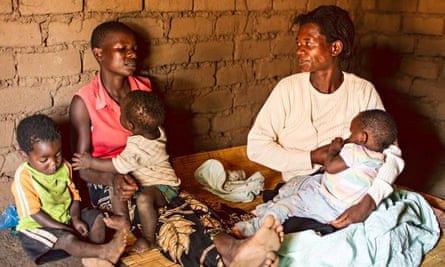
In Chiradzulu district, in Malawi, a “mother buddy” programme is working to support pregnant women who are HIV-positive.
As part of the Improving Parent and Child Outcomes (Impact) programme, run by local churches and the NGO Tearfund, trained volunteers, usually mothers who are themselves HIV-positive, befriend vulnerable pregnant women, visiting them during pregnancy, encouraging them to attend antenatal classes and deliver in a local health centre, and offering advice. A five-year study in South Africa (pdf) found that women who are HIV-positive are six times more likely to die in childbirth or as a result of pregnancy than women without the virus.
“Since starting [the programme], all women have delivered HIV-negative babies, which has contributed to reducing child mortality in this area,” says Fanny Luwemba, a buddy volunteer in Sandi village. “It’s also helped to mobilise men to support their wives.” The number of women dying in childbirth has also dropped, she says.
Last month, the UN working group drawing up goals to replace the MDGs in 2016 published its final draft. Number three of the 17 sustainable development goals (SDGs) relates to health, and includes a target to reduce maternal deaths and ensure universal access to family planning services.
But Fynn-Nyame is apprehensive about what will end up in the final set of goals. She says Marie Stopes has launched a Make Women Matter campaign to ensure the needs of women and girls are at the centre of the process.
“I fear that it [the health goal] will be one of those left to the very end because not everybody is going to agree [on what should be included],” she says. “Some people will want to miss that out and that will be a tragedy. Reproductive health and rights must stay as part of the SDGs. The reduction of maternal mortality must feature highly and the whole world must rally around that.”
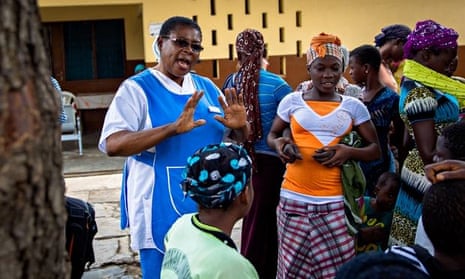
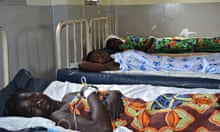
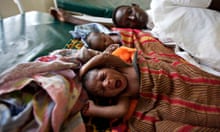
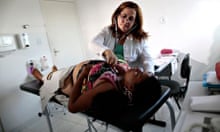
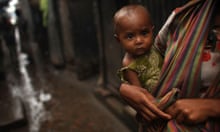
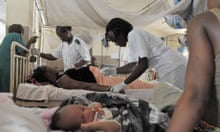
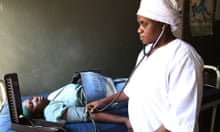

Comments (…)
Sign in or create your Guardian account to join the discussion